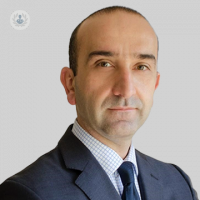Sleeve gastrectomy: Your questions answered
Escrito por:In his latest online article, esteemed consultant general, gastrointestinal and bariatric surgeon Mr George Vasilikostas delves into sleeve gastrectomy, a common weight loss procedure. He explains what the surgery entails, and answers other frequently asked questions.

What is sleeve gastrectomy?
Sleeve gastrectomy is one of the most common weight loss procedures performed nowadays. It has been around for more than 20 years, so it is well-scrutinised and established. It has proven to yield excellent results in terms of weight loss, providing sustainable outcomes in the long term and a high quality of life for our patients.
The procedure is typically performed laparoscopically, which is minimally invasive. It involves removing a significant portion of the stomach, leaving behind a sleeve-shaped organ, resembling a small banana. While it used to be considered a restrictive procedure, we now understand that sleeve gastrectomy works differently by changing hormonal and neural signals between the gut and the brain, resetting the patient's metabolism. This approach addresses the root cause of the problem, which is the deregulation of metabolism in the brain, rather than solely focusing on lifestyle factors or self-inflicted conditions.
Am I a good candidate for sleeve gastrectomy?
Patients with a BMI above 35, especially those with obesity-related comorbidities such as high blood pressure, diabetes, osteoarthritis, sleep apnoea, or PCOS, are good candidates for this procedure. Weight loss surgery has been proven to be extremely safe, with very low rates of serious adverse events compared to other abdominal surgeries.
What are the risks and benefits of sleeve gastrectomy?
The benefits of laparoscopic sleeve gastrectomy include significant weight loss, leading to improved health and overall happiness for patients. In extreme cases with very high BMI or obesity-related comorbidities, it can even enhance life expectancy.
While the procedure carries certain risks and complications, specialists who have been trained and performing these operations for decades ensure it's a safe procedure. The risk of complications or mortality is comparable to other common abdominal surgeries. Therefore, the benefits of weight loss surgery far outweigh the risks, making it the most effective treatment for weight loss and improving obesity-related comorbidities, such as diabetes.
How much weight can I expect to lose with sleeve gastrectomy?
After laparoscopic sleeve gastrectomy, patients can expect to lose an average of 60 to 70% of their excess weight or about 35% of their total weight. This weight loss typically occurs rapidly within the first few weeks and months following the procedure, with some continued weight loss over the subsequent two years.
What is the recovery process like after sleeve gastrectomy?
The recovery process from laparoscopic sleeve gastrectomy is relatively straightforward. Patients typically stay in the hospital for one to two days, although selected low-risk patients may even undergo it as a day surgery procedure. The procedure involves general anaesthesia, which is now extremely safe. Patients are required to follow a special diet for two weeks before admission and for the first few weeks after surgery. They receive dietary guidance and information during this period. They are also prescribed pain medications to manage discomfort, typically needed for a few days up to a week post-surgery. Patients can gradually return to their regular activities without restrictions within approximately two weeks.
What are the long-term implications of sleeve gastrectomy?
Laparoscopic sleeve gastrectomy provides excellent and sustainable long-term results. Patients can achieve a significant reduction in excess body weight, typically ranging from 60 to 70%, or about 35% of their total weight. While some patients may experience minimal weight regain, which is considered normal as the body adapts, the majority maintain their weight loss results in the long term. Patients need to engage with their weight loss management team, including surgeons and dietitians, to implement positive dietary and behavioural changes that maximize and sustain these results, reducing the risk of future weight regain.
Mr George Vasilikostas is a renowned consultant general, gastrointestinal and bariatric surgeon based in London. If you would like to book a consultation with Mr Vasilikostas, you can do so today via his Top Doctors profile.


